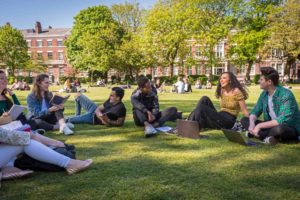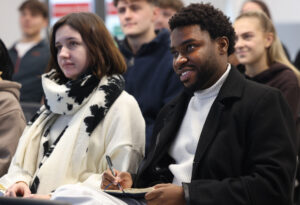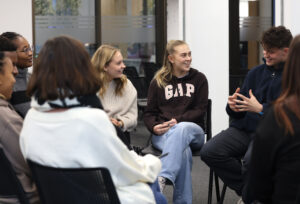Sociology
UCAS code L302
- Study mode
- Full-time
- Duration
- 3 years
- Start date and application deadlines
-
- Start date
UCAS code L302
Our approach to sociology engages you in a critical study of society. You will learn to make sense of what drives change in the social world and the possible directions this change may take.
The effect of new ideas, technologies, government programmes and social conflict on everyday life is explored through your study of a broad range of subjects that take in local, national and global social relationships. The aim is to give you a comprehensive grasp of the sociological imagination and the real world issues it speaks to.
The core modules in year one provide you with a firm foundation for future study. How can sociology help us address social change and divisions? Where can our sociological imagination best apply itself? In year two, you will deepen your understanding of social theory and research methods and broaden your knowledge of society through a range of options. By year three, you will have the choice to study specialist subjects in depth and develop your independent learning.
You may opt for a dissertation and pursue a topic of your choice. Alternatively, you can gain valuable employability skills by opting for our social policy project, combining work experience with your studies and carrying out a piece of research commissioned by a local agency.
Our programmes are based on cutting-edge research and are ideal preparation for careers or further study where clear, creative thinking is valued. From the historical foundations of crime and punishment to the implications of digitisation in social, political, economic and cultural life.

We’re proud to announce we’ve been awarded a Gold rating for educational excellence.
Discover what you'll learn, what you'll study, and how you'll be taught and assessed.
In year one, you’ll be introduced to the classic works of Marx, Weber and Durkheim before exploring a range of 20th-century social theorists, thus laying a strong foundation for future study. On the practical side, there are two linked modules, Social Change and Social Policy in Contemporary Society I and II, which examine issues such as the family, social class, gender and ‘race’. A further introductory module, Studying Society, explores the use of social science research methods and ensures that by the second year, you are fully acquainted with all the skills you need to progress in your studies.
*Some modules may not be available depending on your selected programme of study.
Programme details and modules listed are illustrative only and subject to change.
Having established a firm grounding, you’ll begin to increase your in-depth understanding of social theory and research methods, and broaden your knowledge of different topics in the discipline through a wide range of options.
*Some modules may not be available depending on your selected programme of study.
| Compulsory modules | Credits |
|---|---|
| QUANTITATIVE SOCIAL RESEARCH METHODS (SOCI247) | 15 |
| QUALITATIVE SOCIAL RESEARCH METHODS (SOCI248) | 15 |
| THINKING SOCIOLOGICALLY: APPROACHES TO SOCIAL INQUIRY (SOCI242) | 30 |
Programme details and modules listed are illustrative only and subject to change.
By year three, you will have the choice to study specialist subjects in depth and develop your independent learning. Those who opt for a dissertation are given the freedom to pursue their interest in a topic of their own choice, whilst those opting for our applied social research or social policy project have the opportunity to combine work experience with academic rigour. We have considerable expertise in aligning your research interests with the needs and aims of local agencies.
*Some modules may not be available depending on your selected programme of study.
You must choose SOCI301 or SOCI303 or SOCI347 or SOCI311 (semester one only).
| Compulsory modules | Credits |
|---|---|
| DISSERTATION (SOCI301) | 30 |
| INTERCHANGE PORTFOLIO: WORK-BASED LEARNING (SOCI303) | 30 |
| CREATIVE CONSULTANT: DISSERTATION BY PORTFOLIO (SOCI347) | 30 |
| SHORT INTERCHANGE PROJECT (SOCI311) | 15 |
Programme details and modules listed are illustrative only and subject to change.
Studying Sociology as 50% of your degree gives you a thorough understanding of the way in which society works. Core modules in year one provide you with a firm foundation for future study.
Sociological theory embraces the classic work of Marx, Weber and Durkheim and a range of 20th century social theorists. A further 30 credits are available within Sociology and you may choose from the following modules. Social change and social policy investigates contemporary controversies around issues such as the family, social class, gender and ‘race’. Studying society looks at the basics of social scientific work, including research methods, and an introduction to IT – ensuring you are fully conversant with utilising online resources. Both introduction to crime and society, and controlling crime explore key concepts in the criminology and criminal justice process.
Year two compulsory modules include thinking sociologically: approaches to social inquiry, and social research methods.
In year three, you will have the choice to study specialist subjects in-depth and develop your independent learning. You may opt for a dissertation and pursue a topic of your choice.
Alternatively, you can gain valuable employability skills and opt for our Applied social research module or Social policy project and combine work experience with your studies, by carrying out a piece of research commissioned by a local agency.
You will be taught through a combination of face-to-face teaching in group lectures and small class sessions, tutorials and seminars, which are supplemented by opportunities to get one-to-one guidance from academic staff during their weekly ‘open office’ hours. The rest of your study time will be spent undertaking directed independent study, making use of our excellent library and IT facilities.
You will also be supported throughout by an individual academic adviser. Learning is delivered in a variety of formats including lectures, seminars, workshops, tutorials, guided independent study, group work and reflective and experiential learning.
The primary purpose of lectures is to provide you with a broad introduction to key areas and debates on a given topic pitched at the appropriate level of study. The lectures aim to facilitate your reading and highlight issues to be explored during independent study time in preparation for seminars and assessment.
Seminars provide opportunities to explore particular issues and debates in greater detail in a way that supplements and builds upon the lectures. Seminars also allow for greater levels of student participation and such participation will be actively encouraged throughout the programme. Workshops frequently follow the format of seminars but they also may be used to develop particular skills in a teaching context. For example, workshops develop skills in data analysis and skills in interviewing.
Guided independent study may also feature in your learning experience. Group work is a feature of all seminar teaching and group work takes place both with and outside of formal scheduled classes.
Assessment takes many forms, each appropriate to the learning outcomes of the particular module studied. Most modules are assessed by means of a mixture of essays and examinations. Typically, a module in yeartwo might involve a 4,000 word essay or a 2,500 word essay plus a one hour examination. Some modules are assessed wholly or in part by other appropriate means, such as the preparation of projects and individual or group presentations. The final degree class is based on year two and three marks, weighted in favour of year three marks.
We have a distinctive approach to education, the Liverpool Curriculum Framework, which focuses on research-connected teaching, active learning, and authentic assessment to ensure our students graduate as digitally fluent and confident global citizens.
The Liverpool Curriculum framework sets out our distinctive approach to education. Our teaching staff support our students to develop academic knowledge, skills, and understanding alongside our graduate attributes:
Our curriculum is characterised by the three Liverpool Hallmarks:
All this is underpinned by our core value of inclusivity and commitment to providing a curriculum that is accessible to all students.
The qualifications and exam results you'll need to apply for this course.
| Qualification | Details |
|---|---|
| A levels |
BBC |
| BTEC Level 3 national extended diploma |
DDM. |
| BTEC combinations |
BTEC National Diploma DM plus B at A level; BTEC National Extended Certificate M plus BB at A level. |
| Welsh Baccalaureate Advanced |
C in the Welsh Baccalaureate, plus BB at A level |
| Access |
Pass relevant Access to HE Diploma with 45 Level 3 credits with 27 at Distinction and 18 at Merit |
Studying with us means you can tailor your degree to suit you. Here's what is available on this course.
University of Liverpool students can choose from an exciting range of study placements at partner universities worldwide. Choose to spend a year at XJTLU in China or a year or semester at an institution of your choice.
Immerse yourself in Chinese culture on an optional additional year at Xi'an Jiaotong Liverpool University in stunning Suzhou.
Broaden your world by spending an additional year of study at a partner university abroad following your second year of study.
Take a semester of your second year of study at one of our worldwide partner institutions.
Spend a summer abroad on a study placement or research project at one of our worldwide partner institutions.
Every student at The University of Liverpool can study a language as part of, or alongside their degree. You can choose:
With a combined degree, you can study two subjects as part of the same degree programme.
Explore combined degrees for Sociology, Social Policy and Criminology courses
Your course will be delivered by the Department of Sociology, Social Policy and Criminology, in the School of Law and Social Justice Building. You’ll have access to state-of-the-art facilities and be a short walk from the Sydney Jones Library. Based in the Knowledge Quarter, just 10 minutes’ walk from the city centre, you’ll be surrounded by history and culture.






From arrival to alumni, we’re with you all the way:

Want to find out more about student life?
Chat with our student ambassadors and ask any questions you have.
We will enable you to develop a range of social scientific, analytic and communication skills and a variety of transferable skills valued by many employers in a range of industries (eg media organisations, local government and charitable organisations, and commercial and financial service sectors).
Our graduates have gone onto successful careers in:
Studying with us also provides a sound basis from which you will be able to pursue postgraduate studies either with a vocational orientation (MA in Social Work, Legal Practice Course, for example) or to further your research skills at masters and doctoral levels.
We invite you to take part in SLSJ Extra—a series of talks and workshops featuring experts from the legal, criminal and voluntary sectors, along with leading professionals and reform advocates from the UK and beyond. Through SLSJ Extra, you’ll see how the fields of law, sociology, social policy and criminology can open doors to a wide range of fulfilling careers. This rich extracurricular experience supports your future aspirations and helps you explore where your studies can take you.
We’re also here to help you make the most of work experience opportunities. In your second year, you can choose to integrate work experience into your studies. By your third-year, you can take advantage of work placements through our Interchange service, which connects you with voluntary and charitable organisations across the region, giving you the chance to apply your skills in real-world settings. You can also gain valuable volunteering experience with support from our Employability & Interchange Coordinators or by joining the Peer Mentoring Scheme.
We offer placements that allow you to undertake research projects with real impact on both local and national communities. These opportunities continue to grow each year. This year, for example, our research placements include collaborations with organisations such as the National Youth Advocacy Service and The Heseltine Institute.
Wherever you want to go, we’ll help you get there.
Typical courses studied by graduates from this programme:
79% of sociology, social policy and criminology students find their main activity after graduation meaningful.
(Graduate Outcomes, 2018-19.)
Your tuition fees, funding your studies, and other costs to consider.
Full-time place, per year - £9,535
Year abroad fee - £1,430 (applies to year in China)
Full-time place, per year - £24,100
Year abroad fee - £12,050 (applies to year in China)
The tuition fees shown are correct for 2025/26 entry. Please note that the year abroad fee also applies to the year in China.
Tuition fees cover the cost of your teaching and assessment, operating facilities such as libraries, IT equipment, and access to academic and personal support. Learn more about paying for your studies.
We understand that budgeting for your time at university is important, and we want to make sure you understand any course-related costs that are not covered by your tuition fee. This could include buying a laptop, books, or stationery.
Find out more about the additional study costs that may apply to this course.
We offer a range of scholarships and bursaries that could help pay your tuition and living expenses.
If you’re a UK student joining an undergraduate degree and have a household income below £35,000, you could be eligible for a Liverpool Bursary worth up to £2,000 for each year of undergraduate study.
Apply for an Asylum Seekers Scholarship and you could have your tuition fees paid in full and receive help with study costs. You’ll need to have applied for asylum in the UK, or be the dependant of an asylum seeker, and be joining an eligible undergraduate degree.
If you’ve spent 13 or more weeks in Local Authority care since age 14, you could be eligible for a bursary of £3,000 per year of study. You’ll need to be a UK student joining an eligible undergraduate degree and be aged 28 or above on 1 September in the year you start.
Are you a UK student with a Black African or Caribbean heritage and a household income of £25,000 or less? You could be eligible to apply for a Cowrie Foundation Scholarship worth up to £8,000 for each year of undergraduate study.
If you’re a UK student identified as estranged by Student Finance England (or the equivalent UK funding body), you could be eligible for a bursary of £1,000 for each year of undergraduate study.
Joining a School of Biosciences degree and have a household income of less than £25,000? If you’re a UK student, you could apply to receive £4,500 per year for three years of your undergraduate course.
Do you live in the Liverpool City Region with a household income of £25,000 or less? Did neither of your parents attend University? You could be eligible to apply for a Nolan Scholarship worth £5,000 per year for three years of undergraduate study.
Are you a UK student with a household income of £25,000 or less? If you’ve participated in an eligible outreach programme, you could be eligible to apply for a Rigby Enterprise Award worth £5,000 per year for three years of your undergraduate degree.
Are you a UK student with a household income of £25,000 or less? Did neither of your parents attend University? You could be eligible to apply for a ROLABOTIC Scholarship worth £4,500 for each year of your undergraduate degree.
Apply to receive tailored training support to enhance your sporting performance. Our athlete support package includes a range of benefits, from bespoke strength and conditioning training to physiotherapy sessions and one-to-one nutritional advice.
Joining a degree in the School of Electrical Engineering, Electronics and Computer Science? If you’re a UK student with household income below £25,000, you could be eligible to apply for £5,000 a year for three years of study. Two awards will be available per academic year.
If you’re a young adult and a registered carer in the UK, you might be eligible for a £1,000 bursary for each year of study. You’ll need to be aged 18-25 on 1 September in the year you start your undergraduate degree.
Use our handy chatbot for your Clearing enquiries.
Last updated 17 June 2025 / / Programme terms and conditions